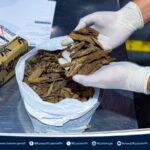More than 550,000 individuals will be affected by the threat of the US government’s freeze order on foreign aid, which includes efforts to curb HIV cases in the Philippines, the country director of UNAIDS Philippines said on Thursday.
The Philippines is among the 55 countries benefiting from the US President’s Emergency Plan for AIDS Relief (PEPFAR).
But UNAIDS country director Louie Ocampo lamented that President Donald Trump’s freeze order on any foreign assistance could disrupt ongoing services for the 550,179 members of the key populations in PEPFAR-supported regions: National Capital Region, Central Luzon, Calabarzon, Western Visayas, and Central Visayas.
“PEPFAR is supporting a number of community-led organizations, as well as the DOH and LGUs. The initial implication is to stop the operations of all these organizations which could result in loss of jobs,” said Ocampo in a forum.
“The loss of safe spaces of HIV key populations – transpeople, people who inject drugs, men who have sex with men, and young key populations – is one major immediate impact of this US policy,” he added.
Of the more than 550,000 key populations in the Philippines, 381,802 are men who have sex with men; 45,873 female sex workers; 114,184 transgender women; and 8,320 are people who inject drugs.
Ocampo said that if the Philippine government will not step in to shoulder the funding for HIV mitigation efforts, the long-term effect of the US foreign aid freeze will be “frightening.”
“The long-term effects are more frightening. If the government will not step in to absorb the funding of programs being supported by the US grants, the gains we have made will be jeopardized,” he said.
“Decrease in uptake of HIV services can have a long and serious consequence which could make the transmission much faster,” he said. “More people will be infected and more people will die of AIDS because of late diagnosis and treatment.”
UNAIDS data showed that as of 2023, there were 189,900 people living with HIV; 26,700 annual new infections; and 1,700 deaths due to acquired immunodeficiency syndrome (AIDS) – the severe stage of HIV infection when left untreated.
“Just to cite an example of how US funds affect my organizations, currently we have six ongoing projects with the government and various agencies which we have to suspend,” said Ocampo, noting that these projects aim to craft a national strategic plan and other initiatives on HIV.
Ocampo said that the Department of Health developed an HIV co-financing plan for 2024-2026 with a required budget of P45.6 billion for health-related plans. But the UNAIDS official said that there is still a funding gap of P22.4 billion.
“My vision is for the country to start owning the HIV response. Owning for me would mean the government providing all the sources needed including full funding support to implement all the necessary interventions to halt the epidemic,” said Ocampo.
The DOH earlier assured the public Thursday that the delivery of health services to Filipinos will not be affected despite the temporary suspension of foreign assistance from the US.
Health Secretary Ted Herbosa has reportedly been facilitating multilateral arrangements with various countries “to support health systems strengthening activities towards universal health care for many conditions of all Filipinos.”
Meanwhile, advocacy group LoveYourself said that its HIV testing and treatment will continue despite the controversial US policy. But it added other services such as free pre-exposure prophylaxis, self-testing kits, and campaigns could be affected.
According to the World Health Organization, HIV is transmitted through bodily fluids such as blood, semen, and breast milk. It is not transmitted through physical contact like hugging and kissing, and sharing of food.—LDF, GMA Integrated News



